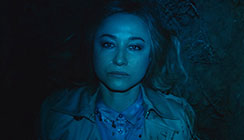|
|
|
|
Fugue
|
 |
|
Something that Nicholas Ray was angling for in the cavernous, widescreen framings of a family home in Bigger Than Life (1956) returns forcefully in the corners, staircases and glassy vistas of the central house in Agnieszka Smoczynska’s equally rectangularly-composed Fugue. Something disquieting, alienating, even (at extreme moments) menacing. Indeed, with its drawn-out rhythms, elongated poses and gestures, and close attention to architectural detail, the balance, across, the film, tilts more toward the performance-art patina of Joanna Hogg’s Exhibition (2013) than Ray’s seething, quasi-Biblical melodrama. Like numerous films of the past two decades, this one takes up the “fugue state” of mental and emotional dissociation. The beginning is striking: from the dark, aural womb of the disorienting, treated noises of a railway tunnel (Marcin Lenarczyk is credited as sound/music supervisor) there emerges Alicja (well-known Polish actor Gabriela Muskala, who also wrote the screenplay): she climbs from the tracks onto a well-populated platform, lowers her undies, and starts pissing. Cue for a disorienting ellipse: TWO YEARS LATER. Alicja, who has spent that time presumably wandering Warsaw destitute, lands into medical and psychiatric care. Her supervisor sticks her on a TV show and, wham! She is identified by her parents, far away, as Kinga. Time to go home. Despite its nods to Lucrecia Martel (a mysterious road incident as in The Headless Woman [2008]) and David Lynch (opening credits animation of a bug emerging from a woman’s mouth!), and various, distorted, psychically re-coded flashes of what is probably Alicja/Kinga’s ‘primal scene’, Fugue is not really centrally invested in the mechanics – or the mystery – of the dissociative mental state. It’s less Lost Highway or The Blackout – 1997 sure was a great year for zoning-out! – than Ulu Grosbard’s unjustly forgotten The Deep End of the Ocean (1999): a family drama in which, due to its stolen-child premise (akin to William Friedkin’s glorious Bug [2006]), every member becomes, more than ever, strangers to every other member. What there was, and maybe still can be, of love, support and ritual will have to be re-found, reinvented. But Kinga resists – all the way – any reintegration into the role of good (or even bad) wife and mother. That is really what the film is about: an indirect, happy alibi for a woman’s hard-as-nails self-determination. (Without giving anything away, there’s a connection between this film’s ending and a major element in three later films: Melisa Önel’s Suddenly [2022], Laura Citarella’s Trenque Lauquen [2022] and Víctor Erice’s Cerrar los ojos [2023].) Our cold heroine smells immediately the intrigue that binds her husband (Lukasz Simlat as Krzystof) to another woman (Malgorzata Buczkowska as Ewa), and she doesn’t much care about it. Her indifference toward her son (Iwo Rajski as Daniel) is, however, a more vexing matter – and to, in any fashion, resolve that, Fugue will have to wind back to revelatory plot matters hinging on the rubbed-out past. That creates a growing tension in the material: is dissociation a pretext for another symbolic level (i.e., unalienated selfhood), or is it, in itself, the central thematic knot (hinging, as it inevitably does, on trauma and mourning) to be untied? Like many contemporary horror movies and fantastique-tinged thrillers (from Julia Ducournau's lumpy work to Andrew Semans’ intriguing Resurrection [2022]), Smoczynska never quite finds the best two-step procedure to sort out the relations between narrative premise and elaborated theme. (Whereas a sturdier, surer example is Jonathan Glazer’s mind-boggling Birth [2004].) But, on other levels of the project, she exhibits a fine control of the filmic elements. Smoczynska’s career (already three features) is clearly one to catch up on in toto. © Adrian Martin 31 July 2023 |
![]()